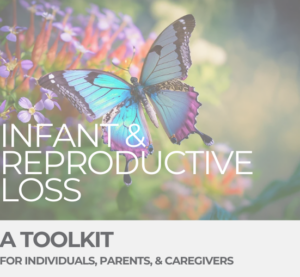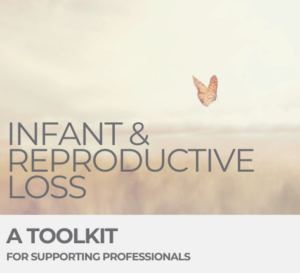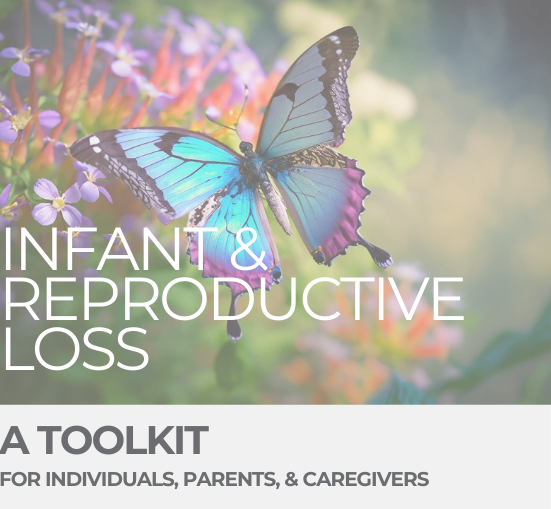Posts Tagged ‘miscarriage’
Infant & Reproductive Loss Toolkit [Free Downloadable PDFs for Individuals and Professionals]

Navigating life, death, and loss can be overwhelming. Mental health professionals designed this toolkit for individuals, parents, caregivers, and families navigating perinatal and reproductive loss.
Reactions to pregnancy and reproductive loss are as unique as fingerprints. Some can process the experience relatively quickly, while others experience unrelenting pain and grief.
We hope that this toolkit can be used to add tools to your toolbox and offer words of support, guidance, and care as you navigate life after loss.
Download the Infant and Reproductive Loss Toolkit for Individuals HERE.

Navigating life, death, and loss can be overwhelming. This toolkit was designed by mental health professionals for other professionals who support individuals during their reproductive years and beyond.
It contains information about grief and navigating the impact of loss alongside your clients.High-quality grief care includes compassionate and open communication, informed choice and individualized care. Compassionate communication, the most important element, is required in all aspects of care throughout and following loss.
Download the Infant and Reproductive Loss Toolkit for Supporting Professionals HERE.
When Your Friend Has a Miscarriage
When Your Friend Has a Miscarriage
Alyssa Warmland is a content artist whose work focuses on fumbling towards an ethic of care and empowering people to share their stories in a way that keeps them well.
When my partner and I decided we were ready to have a baby, we thought it would be easy. Turns out, we were wrong. After six months of hoping, our first pregnancy was a chemical pregnancy. Two months later, I was pregnant again. When an ultrasound at 7 weeks showed no heartbeat, the loss was drawn out and difficult, requiring multiple interventions. I got pregnant again a few months later, and lost that one too.
We wanted to be open with people close to us, since these losses were huge in our life. When we told people, we found that most women we knew had their own miscarriage stories, and we found that, like with any loss, people rarely know what to say.
There’s nothing that can be said to change the fact that someone you care about has experienced a loss. Still, here are some ideas about what can help after a miscarriage:
1. I’m sorry you’re going through this.
As someone who has experienced several significant deaths, I feel pretty confident saying that this is a solid way to respond in any situation where someone is grieving for any kind of loss. It’s appropriate to acknowledge that they’re going through something.
2. Do you want to talk about it?
If you’re fairly close with this person, it’s worth asking if they want to talk about it. Be sure you have the emotional capacity and physical time to take that on. If you don’t have that emotional capacity or physical time, just don’t offer. Some people don’t process grief by talking about it, or they may just not want to in a particular moment. By asking, you’ve given them the option, letting them know you will hold space to talk about it if they wish.
3. Do you want some company? I’m available at [time, days].
This is another way of identifying a way you feel capable of being supportive. It can be lonely when you’re grieving and it helps to have people around physically. Sometimes it’s nice to have a distraction and talk about completely unrelated things. Miscarriage can be an intense experience, both physically and emotionally, at times, but it’s important to consider that even grieving people are whole humans and their grief isn’t all that’s going on for them.
4. I get that you’re going through a lot right now. Take whatever time you need.
It can be helpful to know that people realize you need a little gentleness or time or space or care. We live in a society where we put a lot of pressure on women to carry on with their lives during their pregnancy, especially early pregnancy, which people are typically expected to hide. It can be pretty challenging to carry on with everything in your life when you’re exhausted and nauseous. Miscarriage can be painful, physically and emotionally.
5. What kind of soup do you like?
Bringing people food is rarely a bad idea, especially if they’re sad or not feeling well. Soup is warm, comforting, and most people like at least one kind. Be a friend. Bring soup.


